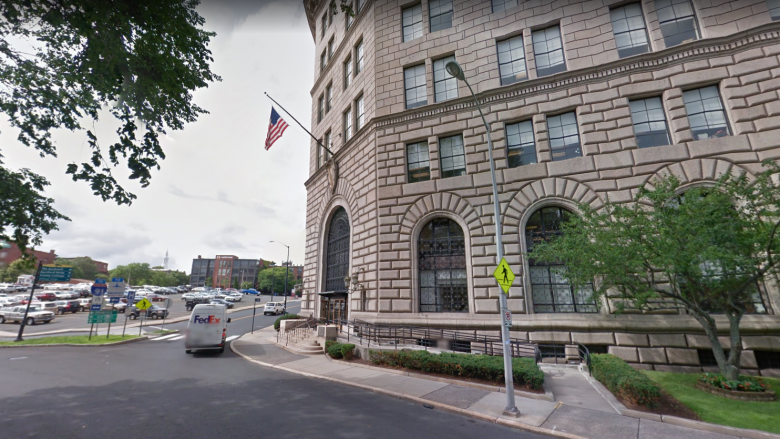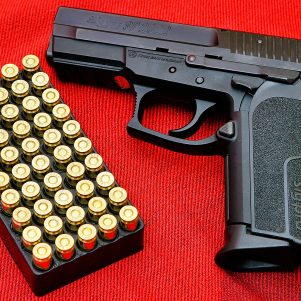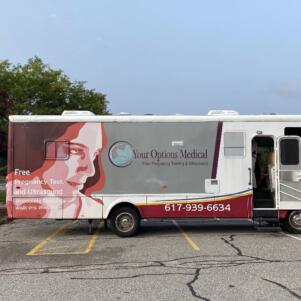Who’s Right on Gun Ban? Legislative Report Contradicts Connecticut’s Argument In Gun-Seizure Case
By Evan Lips | August 31, 2017, 18:24 EDT
 Pulaski Circle in Hartford, Connecticut, home to the offices of state Attorney General George Jepsen.
Pulaski Circle in Hartford, Connecticut, home to the offices of state Attorney General George Jepsen. Connecticut’s State Police chief and an office of the state Legislature disagree over the meaning of a 2013 gun ban, and who’s right will determine whether certain types of guns will continue to be legal in the state.
Records show that the stance taken in state Superior Court by Doris P. Schriro, commissioner of the Connecticut Department of Emergency Services and Public Protection, contradicts a report on the 2013 law released by the state Legislature’s Office of Legislative Research.
But Schriro appears to have the upper hand currently, because a state judge has ruled that she’s right. The judge found that a memo from Schriro’s predecessor saying that it’s legal to own so-called assault weapons made before September 1994 wrongly interprets the statute.
But the research arm of the legislators who passed the law disagrees.
“The assault weapons exempt from the law’s transfer and registration requirements are semiautomatic rifles, shotguns, or pistols not listed by name under the original assault weapons ban but defined as such because they have at least two of a list of features specified in the statutes in effect on January 1, 2013 and legally manufactured before September 13, 1994 (the date the now expired federal ban on assault weapons took effect),” the December 2013 Office of Legislative Research memo states. “This means that anyone owning any of these pre-1994 weapons does not have to register it.
“Nor is the firearm subject to the restrictions placed on the transfer of registered assault weapons.”
The memo does specify, however, that the Office of Legislative Research “is not authorized to give legal opinions and this report should not be construed as such.”
Earlier this week, multiple Connecticut-based firearms dealers — believing that an official order outlawing pre-ban weapons was imminent — were spooked enough to unload their inventory, with one dealer saying in a conversation with New Boston Post that he took a considerable loss during the panicked flurry of transactions. A source inside the state Department of Emergency Services and Public Protection’s firearms licensing division have told New Boston Post that an announcement is forthcoming, but was unable to specify what to expect — except that it will be coming from said division.
Meanwhile, Connecticut Attorney General George Jepsen’s office, representing DESPP commissioner Schriro in a federal civil suit filed by a Coventry man who claims local police illegally seized a cache of registered firearms, argued in court in May that the pre-ban interpretation issued by Schriro’s predecessor, Reuben F. Bradford, should be null and void.
The May argument was delivered in state Superior Court when attorneys representing 86-year-old Joseph Kaminsky, who apparently began his gun-collecting hobby during the 1980s, attempted to force the state to return to him three pre-ban models still being held under lock-and-key at a State Police facility in Meriden. A review of court records shows that the firearms — an Uzi, an AK-47, and an M-11 — were all manufactured prior to the September 13, 1994 cutoff date. Records show that Kaminsky, however, never registered them as assault weapons, which State Police claim he was required to do immediately after Governor Dannel Malloy in April 2013 signed the state’s latest version of a sweeping assault weapons ban.
(Click here for more information on Kaminsky’s case)
Kaminsky’s attorneys have pointed to an October 2013 memo produced by Reuben F. Bradford, Schriro’s predecessor, which states that section 11 of the new law signed by Malloy “clarifies that it is the intent of the Legislature to exclude assault weapons manufactured before Sept. 13, 1994, from transfer restrictions and registration requirements.”
The section of legislation identified by Bradford four years ago states that the statute “shall not be construed to limit the transfer or require the registration of an assault weapon … provided that such firearm was legally manufactured prior to Sept. 13, 1994.”
Attorneys from the Connecticut Attorney General’s office, representing Schriro, argued otherwise — and records show that Superior Court Judge William H. Bright sided with them.
In a December 2016 brief submitted to the judge by Schriro, attorneys argue that “the regrettably incomplete description of the law, and the apparent inaccurate description of the underlying legislative purpose set forth in the Bradford letter, is not a binding statement of the law upon which the petitioner is entitled to rely.”
Consequently, Assistant Attorney General Stephen R. Sarnoski argued, the court’s chief responsibility is to “ascertain and give effect to the apparent intent of the Legislature.”
“A statute, otherwise unambiguous, does not become so because an individual — even the Commissioner of the Department of Emergency Services and Public Protection — has misstated its obvious intent,” Sarnoski argued in his brief.
As for the claim that Kaminsky could not have registered his three pre-1994 firearms upon the enactment of the 2013 assault weapons ban because they were in the custody of the State Police at the time, Sarnoski did not budge.
“Because he possessed an ownership interest in the assault weapons, even while they remained in the physical custody of the State Police, it was his responsibility to register the weapons as then required by law,” Sarnoski wrote.
As for the Bradford letter, Sarnoski added that despite the fact it was written and signed by the state’s top cop, “everyone is presumed to know the law, and ignorance of the law excuses no one from criminal sanction.”
Sarnoski did not mention the Office of Legislative Research report in his brief. Earlier this week, a spokesman from Jepsen told the New Boston Post that the AG’s office “is not working on any sort of interpretation or guidance regarding laws on semiautomatic weapons,” and added that “no announcement is imminent from our office.”
The judge ruled in favor of Schriro this past May.
Kaminsky is currently appealing the judge’s ruling.
Read Bright’s ruling:
2017 05 24 Bright Ruling by Evan on Scribd











